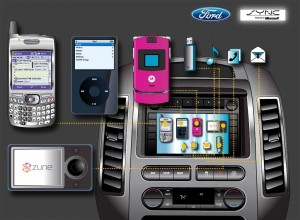
Ford's Sync system gave the maker a taste of what it could achieve working with the high-tech world.
Forget the Rust Belt, Ford Motor Co. is now officially a part of the high-tech world of the Silicon Valley.
Recognizing the rapidly increasing role of digital technology in the automobile, the automaker has opened up a new electronics research lab within a silicon chip’s throw of such high-tech giants as Apple, Google and Intel.
“We have been innovating for more than a century at Ford, but we acknowledge we don’t have a monopoly on creativity,” observed Ford Executive Chairman Bill Ford during the formal dedication of the new lab in Mountain View, California. “Our new office will complement our existing research efforts by allowing us to tap into the region that has been driving consumer technology forward in recent decades.”
Long associated with U.S. the industrial heartland, Ford has been expanding its global reach with a network of so-called “Research and Innovation” facilitiesin Aachen, Germany; Nanjing, China; and its home in the Detroit suburb of Dearborn. It also has hired on technology scouts in Tel Aviv, Israel.
“We want Silicon Valley to view Ford as a platform that is open, accessible and ready for their innovative ideas and technologies,” said Paul Mascarenas, chief technical officer and vice president of Ford Research and Advanced Engineering. “We are looking for unexpected solutions for the future, and we believe Silicon Valley is the right place to round out our global research organization.
Ford’s Silicon Valley Lab will serve as a local touch point for the many relationships Ford already has with Bay Area technology companies and startups. Its core mission, though, is to operate as an independent lab focused on three key areas supporting the future of personal mobility including data, open source innovation and user experience.
“We view technology as more than just an impressive list of microprocessors, sensors and software,” Mascarenas added. “It is the enabler of a safe, intuitive and enjoyable time behind the wheel.”
Ford is increasingly a data-driven company, fusing both internal and external sources to shape product and marketing offerings and support strategic decision making. In addition, vehicle data from the growing list of sensing technologies built into the car can be used to create a more personalized, convenient and productive driving experience, then aggregated to help address congestion and improve efficiency.
Open-source innovation considers the car as a platform and providing access to real-time data allows for the rapid development of custom hardware and software applications. Ford has extensive experience in development of on-board and off-board applications for the SYNC® in-car connectivity system. Now the Silicon Valley Lab is looking at open-source development using the research platform OpenXC developed with Bug Labs.
The user experience means information and services need to be presented to the driver in ways that don’t take away from the primary task of operating the vehicle. Ford is rethinking how drivers and passengers interact with vehicles as well as how vehicles should interact with them. Innovations in design and new technologies can help to optimally organize, filter and deliver content.
“As new ways of processing, curating and filtering information are conceived, the possibilities for enhancing personal mobility are virtually limitless,” said Venkatesh Prasad, general manager of the new lab and senior technical leader of open innovation.
“With many of the finest forward-thinking minds in the world located in the San Francisco Bay region, the Ford Silicon Valley Lab is ideally positioned to interact with and forge connections to local innovators and grow the relationships with our current partners,” Prasad said.
